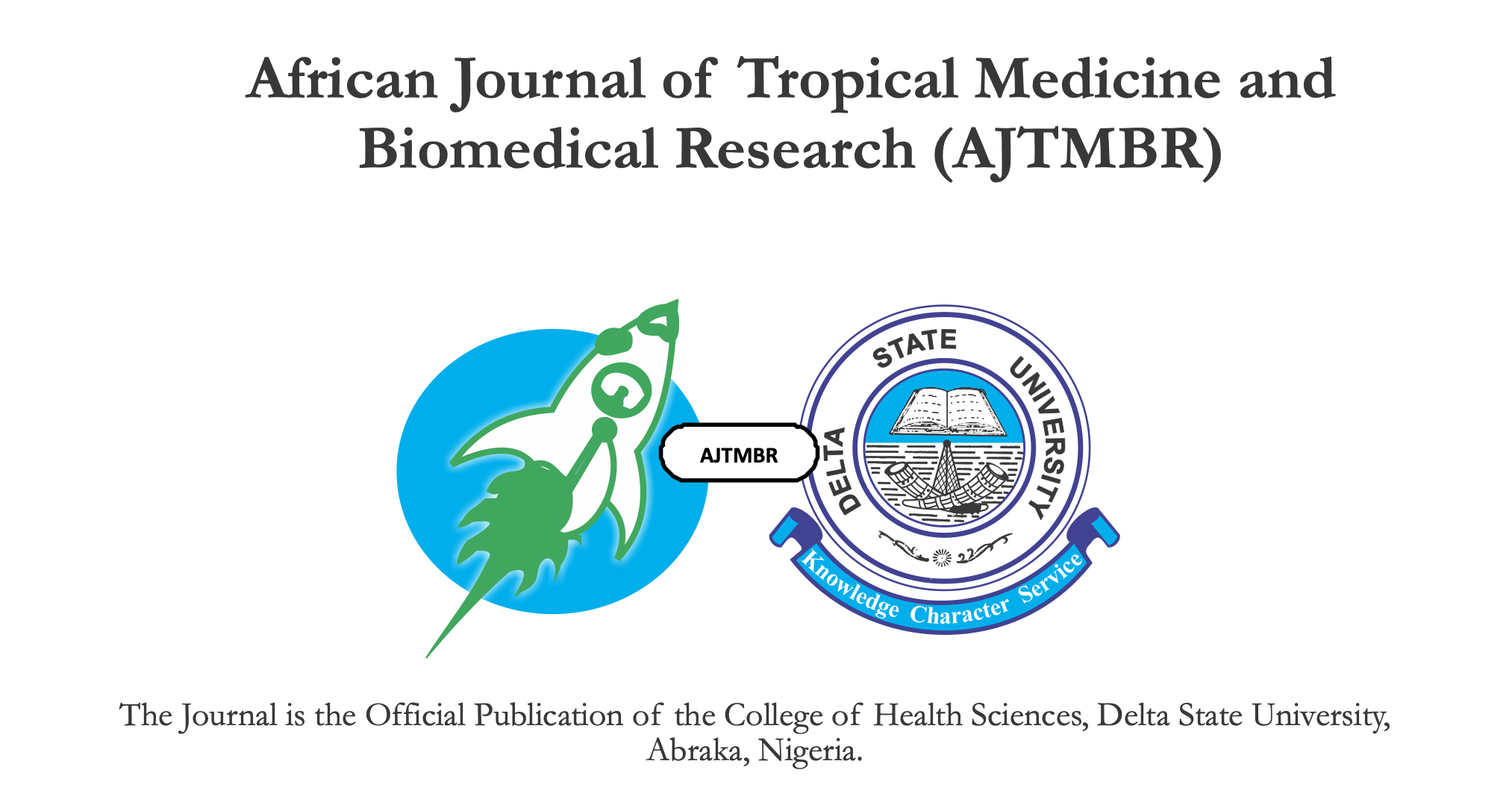Ectopic Pregnancy in an Urban Tertiary Centre in Southern Nigeria: Emerging Trends
Keywords:
ectopic pregnancy, rupture, conservative management, methotrexateAbstract
ectopic pregnancy
Introduction: Ectopic pregnancy is an important cause of morbidity and mortality in early pregnancy. Its’ incidence is rising and management has shifted to less radical and conservative methods with less complications. In resource limited countries like Nigeria, it is pertinent to review management options available in a tertiary referral centre.
Methodology: All cases of ectopic pregnancies managed at University of Benin Teaching Hospital (UBTH) Nigeria between 1st January 2003 and 31st December 2007 were retrospectively reviewed. Socio-demographic and clinical data were retrieved from case files, operating notes, theater and ward registers for analysis.
Results: There were 242 cases of ectopic pregnancies, and 7848 total deliveries during the period reviewed thus giving an ectopic pregnancy incidence of 3.1% (1 in 32 deliveries). Most of the patients (50.9%)werenulliparous. Themajoridentifiedpredisposingfactorswerepreviousabortion(64.5%)and history of pelvic inflammatory disease (37.7%). Majority of the patients (98.7%) had laparotomy while 2.6% had conservative medical management with methotrexate. Ruptured tubal pregnancy (95.6%) was themostcommontypeofectopicgestation. Therewasonematernaldeath,givingacasefatalityrateof 0.4%.
Conclusion: The incidence of ectopic pregnancy in the centre is rising compared to previous report from the institution. Although there is an increasing trend towards provision of conservative management in developing countries, the benefits are largely unharnessed because most patient still present late. This should stimulate aggressive promotion of the benefits of early presentation which include less invasive treatment options.
References
Ekele BA. Ectopic pregnancy. In: Okonofua F. and Odunsi K. (eds), Contemporary Obstetrics and Gynaecology for Developing Countries. Women’s Health and Action Research Centre 2003: 66 – 72.
Esra EB. Worldwide incidence of ectopic pregnancy : a protocol for a systematic review. Postgraduate Training Course in Reproductive Health 2004. Geneva Meeting on CME.
Drife JS. Tubal pregnancy rising incidence, earlier diagnosis, conservative treatment. BMJ 1990; 301: 1057 – 8.
Kouam L., Kamom-moyo AS, Ngassa P. Treatment of ectopic pregnancies by laparotomy in under-equipped countries : a series of 144 cases at the Yaounde University Hospital Centre (Cameroon). J Gynaecol Obstet Biol Reprod Paris. 1996; 25: 804–8.
Gharoro EP, Igbafe AA. Ectopic pregnancy revisited in Benin City, Nigeria : analysis of 152 cases. Acta Obstet Gynaecol Scand2002;81:1139–43.
Olarenwaju RS, Ujah IAO, Otubu JAM. Trends of ectopic pregnancy at the Jos University Teaching Hospital, Jos. Nig Med J 1994; 26: 57–9.
Ilesanmi OA, Sobowale OA. Ectopic pregnancy in Ibadan, Nigeria, Nig Med J 1992; 23: 11–4.
Oronsaye AU, Odiase GI. Incidence of ectopic pregnancy in Benin City, Nigeria. Trop Doct 1981; 11: 160–3.
Symonds I.M. Ectopic pregnancy. Modern management. Current Obstetrics and Gynaecology 1998; 8: 27–31.
Goyaux N, Leke R, Keita N, Thonneau P. Ectopic pregnancy in developing countries :areview. ActaObstet.Gynaecol.Scand. 2005; 82: 305 –12.
Anorlu RI, Oluwole A, Abudu OO, Adebayo S. Risk factors for ectopic pregnancy. Acta Obstet Gynaecol Scand 2005; 84: 184–8.
Orhue AA, Unuigbe JA, and Ogbeide WE. The contribution of previous induced abortions to tubal ectopic pregnancies. West Afr J Med 1989; 8: 257- 63.
O’Conner MIL. After abortion, women who have never had an ectopic pregnancy may be at increased risk of having one. Family Planning Perspectives 1998; 30: 199.
Poonam Y, Upretu D, Banerjet B. Ectopic pregnancy : two years review from BPKIHS, Nepal. Kathmandu Univ Med J (KMJ) 2005; 3: 365 – 9.
Aboyeji AP, Fawole AA, Ijaiya MA. Trends in Ectopic pregnancy in Ilorin. Nigeria. NigJSurgRes2002;4:34–6.
Ola ER, Imoseme DO, Egwuatu JI, Abudu OO. Ectopic pregnancy: Lagos University Teaching Hospital experience over a five year period. Nig J Hosp Med 1999; 9: 100–103.
Onwuhafua PI, Onwuhafua A, Ghadebo AA, Adze J. Ectopic pregnancies at the Ahmadu Bello University Teaching Hospital Kaduna. Trop J Obstet Gynaecol 2001; 18: 82–6.
Otoide VA, Oronsaye F, Okonofua FE. Why Nigerian adolescents seek abortion rather than contraception: evidence from focussed group discussion. Intl Fam Plann Persp. 2001; 27: 77- 81.
Orji EO, Fasuba OB, Adeyemi B, Dare FO, Onwudiegwu U. and Oguniyi S.O. Mortality and morbidity associated with misdiagnosis of ectopic pregnancy in a defined Nigerian population. J. Obstet. Gynaecol. 2002;. 22: 548 – 50.
Luciano AA, Roy G, Solima E. Ectopic pregnancy from surgical emergency to medical management. Ann NY Acad Sci 2001; 943: 235–54.

Downloads
Published
Issue
Section
License
Copyright (c) 2012 African Journal of Tropical Medicine and Biomedical Research

This work is licensed under a Creative Commons Attribution-NoDerivatives 4.0 International License.
Key Terms:
- Attribution: You must give appropriate credit to the original creator.
- NonCommercial: You may not use the material for commercial purposes.
- ShareAlike: If you remix, transform, or build upon the material, you must distribute your contributions under the same license as the original.
- No additional restrictions: You may not apply legal terms or technological measures that legally restrict others from doing anything the license permits.
For full details, please review the Complete License Terms.



